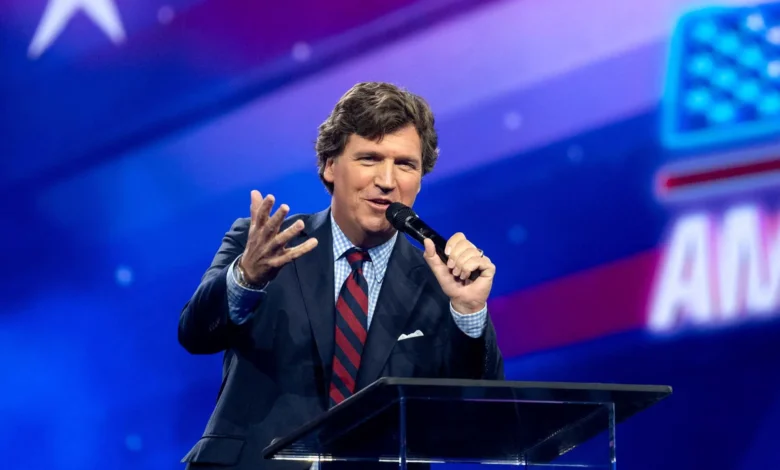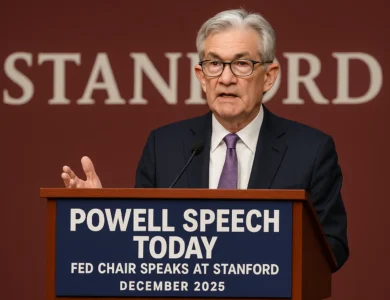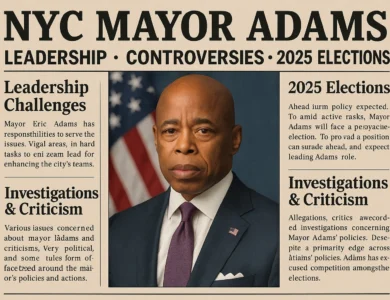
Tucker Carlson, one of America’s most polarizing media personalities, has built a career on provocative commentary that consistently generates headlines and heated discussions. Throughout his tenure as a television host and political commentator, Carlson has delivered statements and taken positions that have not only captivated audiences but also deeply divided public opinion across the United States.
From his early days in print journalism to his prime-time television dominance, Tucker Carlson’s controversial moments have become defining features of modern American media discourse. His ability to generate both fervent support and intense criticism has made him a central figure in discussions about media influence, political polarization, and the role of cable news in shaping public opinion.
The Fox News host has consistently pushed boundaries with his commentary, often addressing sensitive topics including immigration, race relations, foreign policy, and social issues. These divisive statements have resulted in advertiser boycotts, public protests, and countless social media debates, cementing his position as one of the most controversial media figures of the 21st century.
This comprehensive analysis examines seven of Tucker Carlson’s most shocking moments that have left lasting impacts on American political discourse. Each incident demonstrates how a single media personality can influence national conversations, challenge conventional wisdom, and create lasting divisions in public opinion.
1. The January 6th Capitol Riots Commentary
Reframing the Narrative
One of Tucker Carlson’s most controversial moments occurred in his coverage of the January 6th Capitol riots. The Fox News personality presented alternative interpretations of the events that sharply contrasted with mainstream media narratives and official investigations.
Carlson’s commentary included questioning the severity of the riots and suggesting that the events were being politically weaponized. His divisive statements during this period drew criticism from both Democratic and Republican politicians, media critics, and law enforcement officials who were present during the events.
Impact on Public Perception
This controversial media coverage significantly influenced how different segments of the American population viewed the January 6th events. Carlson’s interpretation provided validation for viewers who questioned official accounts while simultaneously deepening political divisions across the country.
The political commentator’s approach to covering this sensitive topic exemplified his willingness to challenge establishment narratives, regardless of potential backlash or criticism from other media outlets and political figures.
2. Immigration and Demographic Change Rhetoric
The “Replacement Theory” Controversy
Tucker Carlson’s immigration commentary has generated some of his most significant controversies. His discussions about demographic changes in America and their potential political implications have been criticized as promoting harmful conspiracy theories.
The television host has repeatedly addressed what he describes as intentional demographic replacement, suggesting that immigration policies are designed to change America’s political landscape. These controversial statements have been linked to various extremist movements and have faced widespread condemnation from civil rights organizations.
Media Response and Consequences
This particular aspect of Carlson’s commentary has resulted in numerous advertiser boycotts, criticism from media watchdog groups, and calls for his removal from television. The divisive rhetoric surrounding immigration has become a defining characteristic of his political commentary style.
Media critics have argued that such discussions contribute to anti-immigrant sentiment and political extremism, while Carlson’s supporters maintain that he’s addressing legitimate concerns about immigration policy and its consequences.
3. Ukraine War Coverage and Russian Relations
Questioning Military Aid
Tucker Carlson’s Ukraine coverage sparked international controversy when he questioned American military aid to Ukraine following Russia’s invasion. His commentary suggested that American involvement in the conflict might not serve U.S. interests.
The Fox News host raised questions about the financial costs of supporting Ukraine and whether American resources would be better spent addressing domestic issues. These controversial foreign policy views put him at odds with bipartisan support for Ukraine in Congress.
International Implications
This divisive commentary drew criticism from foreign policy experts, military officials, and international allies who viewed such statements as undermining Western unity against Russian aggression. Carlson’s position became a focal point in debates about America’s role in international conflicts.
His willingness to challenge conventional foreign policy wisdom demonstrated his commitment to questioning establishment positions, regardless of political consensus or international pressure.
4. COVID-19 Vaccine Skepticism
Public Health Controversy
During the COVID-19 pandemic, Tucker Carlson’s vaccine commentary became another source of significant controversy. His questioning of vaccine mandates, efficacy, and safety protocols put him at the center of heated public health debates.
The political commentator raised concerns about government overreach in implementing vaccine requirements and questioned the transparency of pharmaceutical companies and health officials. These controversial health statements were criticized by medical professionals and public health experts.
Social Media and Misinformation Debates
Carlson’s vaccine-related commentary became central to discussions about media responsibility during health crises and the spread of medical misinformation. Critics argued that his platform gave legitimacy to vaccine hesitancy, while supporters praised his willingness to question official narratives.
This controversy highlighted the tension between media freedom, public health communication, and the responsibility of influential media personalities during national emergencies.
5. Black Lives Matter Movement Commentary
Social Justice Criticism
Tucker Carlson’s Black Lives Matter commentary generated substantial controversy during the height of the racial justice protests in 2020. His criticism of the movement and its methods sparked accusations of racial insensitivity and contributed to national debates about media coverage of social justice issues.
The Fox News personality questioned the movement’s goals, tactics, and impact on American cities, often focusing on instances of violence and property damage during protests. These divisive racial comments drew criticism from civil rights leaders and progressive organizations.
Cultural Impact
This controversial social commentary contributed to broader discussions about race, privilege, and justice in America. Carlson’s approach to covering racial issues became emblematic of conservative media’s response to the Black Lives Matter movement.
The lasting impact of these commentaries continues to influence how different segments of American society view racial justice movements and their legitimacy in pursuing social change.
6. Women’s Rights and Feminist Movement Criticism
Traditional Values Advocacy
Tucker Carlson’s women’s rights commentary has consistently promoted traditional gender roles while critiquing feminist movements and policies. His discussions about women in the workplace, military, and politics have generated significant backlash from women’s rights advocates.
The television host has made statements about women’s capabilities in various roles, often suggesting that feminist policies might harm traditional family structures and social stability. These controversial gender statements have sparked debates about sexism in media.
Professional Consequences
This aspect of Carlson’s commentary has led to criticism from women’s rights organizations, calls for advertiser boycotts, and discussions about gender representation in conservative media. His positions on women’s issues have become defining elements of his political brand.
The divisive nature of these commentaries continues to influence discussions about gender equality, workplace policies, and the role of women in American society.
7. Environmental Policy and Climate Change Skepticism
Climate Debate Positions
Tucker Carlson’s climate change commentary has positioned him as a skeptic of mainstream environmental science and policies. His questioning of climate change data, renewable energy policies, and environmental regulations has drawn criticism from scientists and environmental groups.
The political commentator has suggested that climate change concerns are being used to justify government overreach and economic policies that harm American workers. These controversial environmental statements have contributed to political polarization on climate issues.
Economic vs. Environmental Arguments
Carlson’s approach to environmental issues often emphasizes economic concerns over environmental protection, arguing that climate policies disproportionately harm working-class Americans. This divisive environmental rhetoric has resonated with viewers concerned about job losses in traditional energy sectors.
His climate commentary exemplifies his broader approach of challenging expert consensus and questioning the motivations behind mainstream policy recommendations.
The Lasting Impact on American Media and Politics
Tucker Carlson’s controversial moments have fundamentally shaped contemporary American political discourse and media landscape. His willingness to challenge conventional wisdom, question expert opinions, and address taboo topics has redefined the boundaries of cable news commentary.
These divisive incidents have demonstrated the power of individual media personalities to influence national conversations, mobilize political movements, and create lasting cultural divisions. Carlson’s impact extends beyond television ratings to include political campaigns, policy debates, and social movements across the political spectrum.
The polarizing effect of his commentary has contributed to broader discussions about media responsibility, the role of opinion journalism, and the relationship between entertainment and news in American media consumption.
Conclusion
Tucker Carlson’s seven most controversial moments represent more than individual incidents—they reflect broader tensions in American society regarding politics, culture, and media influence. Each divisive moment has contributed to ongoing national debates about truth, responsibility, and the proper role of media in democratic discourse.
While supporters praise Carlson for his willingness to challenge establishment narratives and give voice to overlooked perspectives, critics argue that his controversial commentary contributes to dangerous polarization and misinformation. Regardless of one’s political perspective, the impact of these moments on American political discourse is undeniable.
The legacy of these controversial incidents will likely continue influencing American media and politics long after Carlson’s career ends. They serve as case studies in the power of media personalities to shape public opinion, challenge conventional wisdom, and create lasting cultural and political divisions in American society.
Read More: Joe Biden’s Top 10 Bold Policies That Transform America






